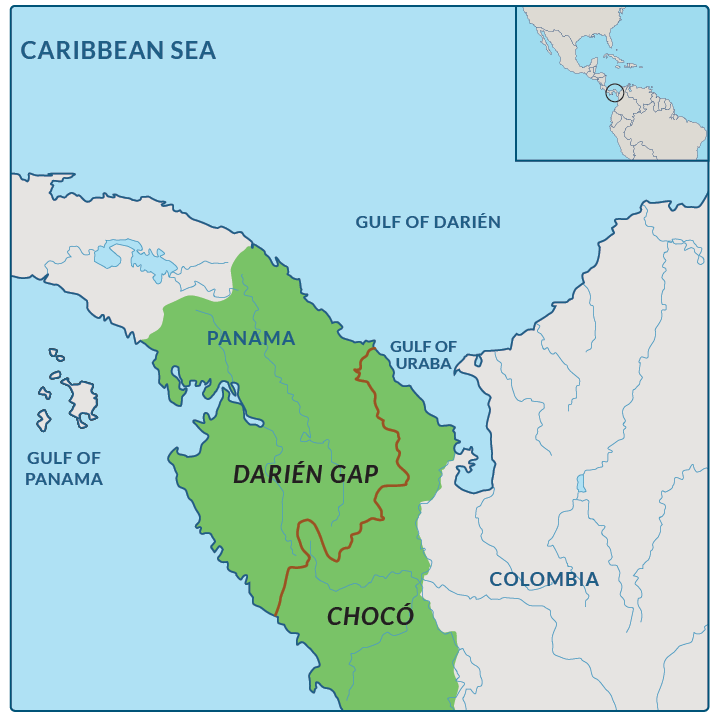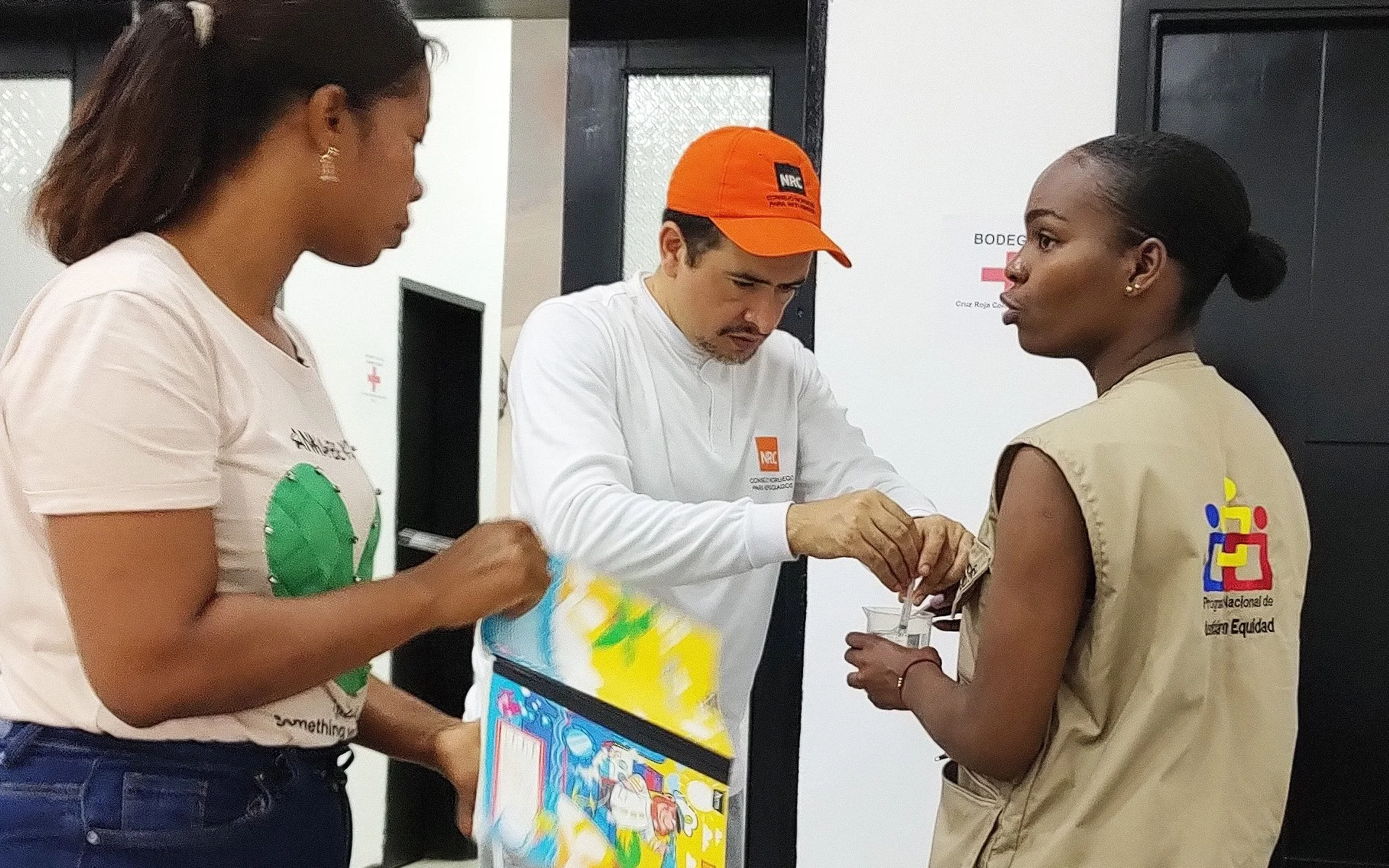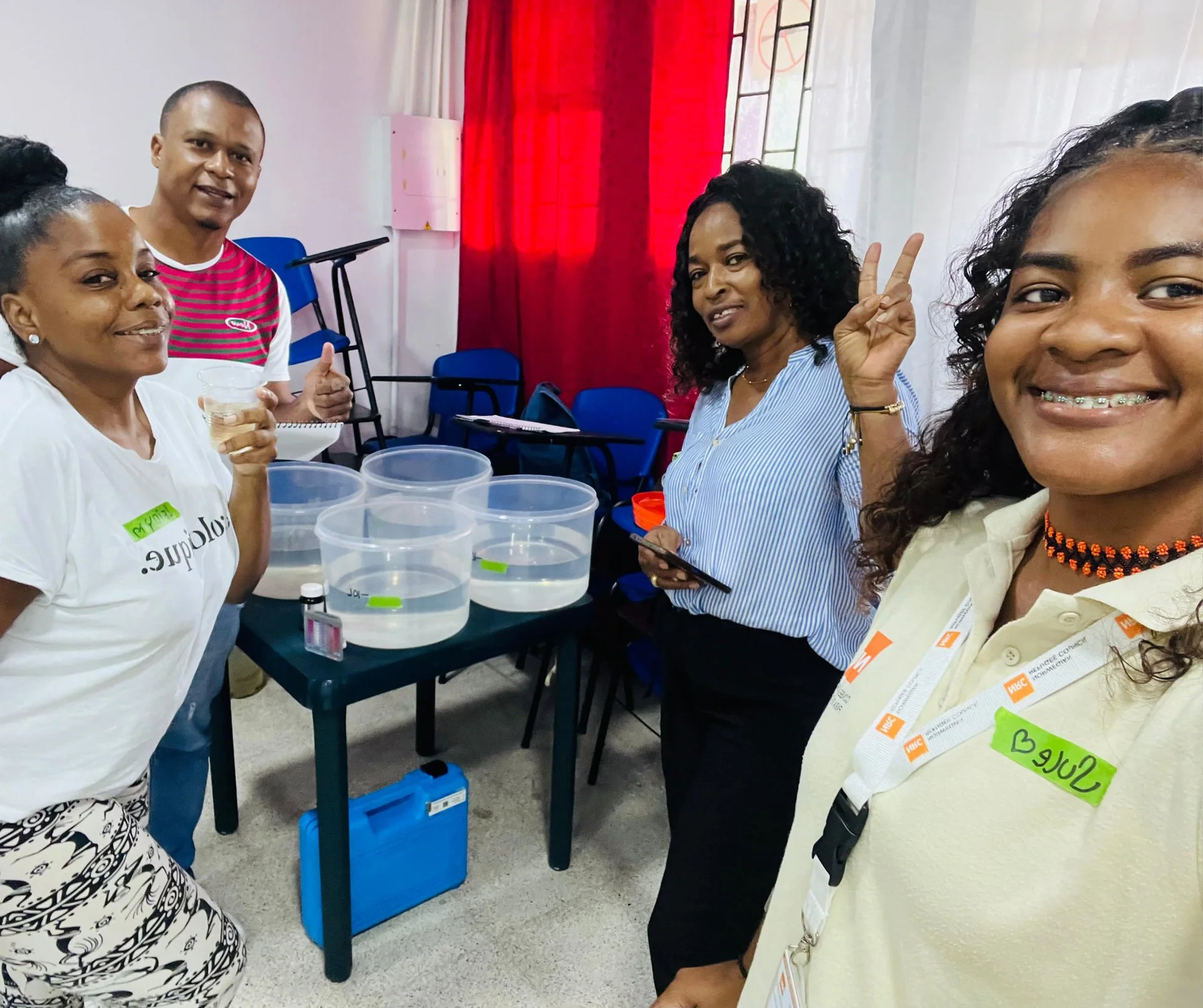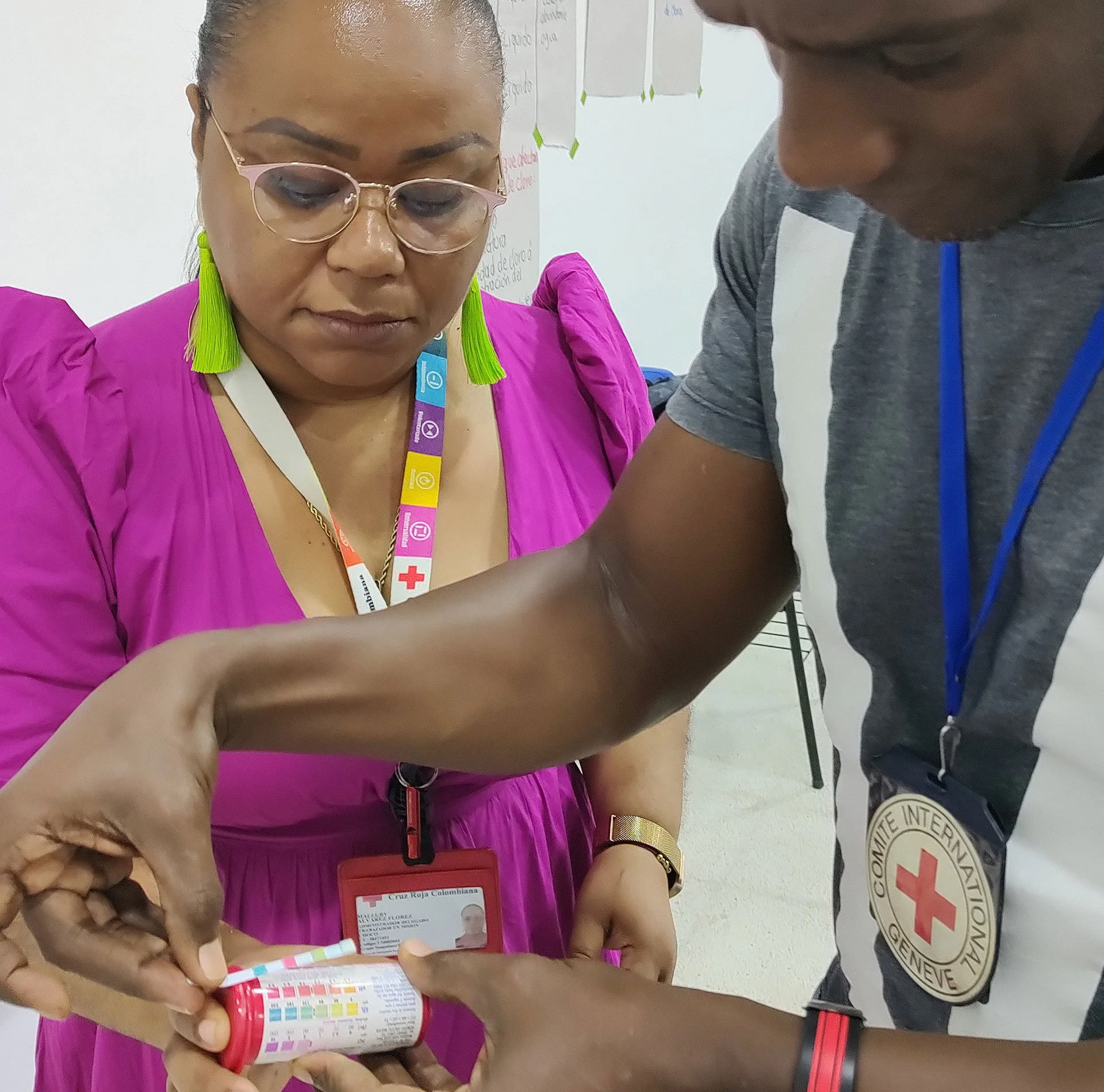The power of collaboration and training in Chocó, Colombia
CAWST Authors: Paola Cárdenas, Senior Manager, WASH Services - Latin America. and Alejandro Bejarano, (former) Business Development Advisor, with support from Mark Ferguson, Senior Marketing and Communications Advisor
In the heart of Chocó, a region on Colombia’s Pacific coast, collaboration is proving to be the cornerstone of effective humanitarian aid and training in clean Water, Sanitation and Hygiene (WASH).
Members of our team from the Centre for Affordable Water and Sanitation Technology (CAWST) traveled to Chocó in July, 2024, along with several local partner organizations, to provide quality in-person training for international and local clients on WASH strategies that could be implemented for the region.
For our staff , the journey began by understanding the unique challenges faced by the Chocó region, often impacted by both man-made conflicts and natural disasters. Through consultation, it became clear that portable water treatments, and especially the use of chlorination tablets in proper dosages, is a top priority for people living in the area and became an important topic for training sessions during the workshop.
At CAWST, one of our strength’s is the ability to identify the needs of local communities and adapt training accordingly. And for this workshop, the unique geography of the region was a factor in why these training needs were identified for our team.
The Darién Gap region shared between Colombia and Panama
Between Colombia and Panama, you will find the region known as the Darién Gap. Consisting of a large watershed, dense rainforest, and mountains, this is the land bridge that connects the American continents, stretching across southern Panama's Darién Province and the northern portion of Colombia's Chocó Department.
The Darién Gap is where thousands of people live in remote, hard-to-reach areas. It is also an area where you will find an ongoing humanitarian emergency and what has become one of the heaviest migration routes on earth. As The Guardian newspaper has reported, in 2023 alone more than 520,000 migrants crossed through The Darién Gap, most with the goal of eventually reaching the United States. This route is extremely dangerous and most people have little more than a backpack. For these migrants, and the people living in the area, access to clean water is critical to their survival and difficult to find.
In this blog post we wanted to explore the importance of collaboration in identifying training needs, developing survey tools, and supporting the delivery of training, particularly in the context of WASH initiatives. We also wanted you to get a chance to meet some of our trusted partners from Colombia, who we work alongside with, sharing the goal of helping thousands of people in the region.
We reached out to our partners and participants from the workshop to ask them about their experiences and what it was like partnering with CAWST.
The following interview was translated from Spanish.
Q: In your opinion, why is clean water, sanitation and hygiene (WASH) an important issue to people living in the Chocó region?
Fabian Bernal Gil - Technical Wash assistance, The Norwegian Refugee Council (NRC):
WASH is essential to improve public health conditions in communities, to reduce sources of contamination, to promote preventive practices against infectious diseases, and to mitigate the mortality of children due to stomach-related illnesses.
Workshop participants, including (centre) Fabian Bernal Gil - Shelter Technical officer, The Norwegian Refugee Council
Suleynis Palacios Ibarguen - Technical Wash assistance, The Norwegian Refugee Council (NRC):
Access to safe drinking water is essential for people living in Chocó. Although Chocó is a region with countless water sources, these sources lack quality, and combined with the department's socioeconomic conditions, access to potable water is indispensable. Additionally, this would contribute to the development of the region.
Workshop participants, including (on the right) Suleynis Palacios Ibarguen, Shelter Technical Officer, The Norwegian Refugee Council - NRC
Mallury Alvarez Florez - Delegate Administrator, Colombian Red Cross Chocó Section:
The lack of appropriate WASH services directly impacts the quality of life, community health, and development opportunities in the Chocó region. Furthermore, the lack of access to safe water and adequate sanitation systems increases the risk of diseases like diarrhea, cholera, and various infections. Regarding the areas needing more support, I believe one of the most important is education and awareness around the safe use of water and hygiene practices, particularly in rural communities.
Marllury Alvarez, Financial and Program Manager from the Colombian Red Cross in Chocó (left) and Pablo Ocoro Wathab from the International Committee of Red Cross sub delegation test for chlorine concentrations in samples to ensure the water is safe to drink.
Q: Are there any issues that you feel need more attention and that could use more support, either from CAWST or other organizations you work with?
Fabian:
I believe that field visits should have a research component to seek alternatives for adapting educational processes to local contexts. For example, finding an element that helps sediment efficiently. I have taken the herbal supplement from the moringa plant, to the field, but the population is unfamiliar with it. I researched with other institutions about Chocoan moringa, and they say there is a species, but I haven't been able to find it. This is an example of how different professionals or organizations could help make WASH educational processes more effective and innovative.
Suleynis:
The methods for reinforcing WASH concepts and instilling these ideas in the communities we serve, as well as our limited consistency and presence, are areas I feel we have struggled with. During training sessions, people understand and grasp the message in the moment, but a month later, if you ask them again, they won’t remember.
Mallury:
We consider that one of the areas requiring more attention and support is the promotion of sanitation practices and safe water management education in isolated communities, specifically indigenous communities. Promoting hygiene, combined with resources to implement sustainable solutions, would help reduce the risk of disease and improve living conditions in these areas, which face multiple sanitation issues every year. Additionally, it would be valuable for organizations like CAWST to advise local institutions on developing projects that provide sanitation infrastructure and access to drinking water, tailored to the specific needs of each community.
Q: How do you feel about your partnership with CAWST?
Fabian:
It is very important that CAWST has incorporated methods into the WASH educational process, providing practical and easy-to-understand tools, which makes it easier for information to reach people who need to reinforce their habits to create healthier environments.
I thank CAWST for sharing so much useful information, which has been a great help in my work as a professional.
Suleynis:
CAWST’s presence in the work and processes of organizations operating in the region has been fundamental in enabling the exchange of practices and concepts that are often difficult to adapt. It has also allowed us to train trainers and facilitators in all these methodologies.
Mallury:
Collaboration is highly valuable and strategic for addressing the challenges of access to drinking water, sanitation, and hygiene in the Chocó region. By joining efforts, CAWST expands its capacity to create a positive and sustainable impact, leveraging both local knowledge and the resources of our organizations. This partnership not only facilitates the implementation of practical solutions but also promotes education and awareness in communities, which is essential to achieving sustainable improvements in the quality of life for the people in the Chocó region.
Conclusion:
The collaborative efforts in Chocó highlight the importance of working together to achieve common goals. By leveraging the strengths of international and local organizations, and through effective coordination and resource sharing, we can build a robust support system that enhances the capacity of WASH actors. This not only addresses immediate humanitarian needs but also ensures the sustainability and continuous improvement of WASH services in the region.
At CAWST, our mission is to provide technical training and consulting, and act as a centre of expertise in water and sanitation for the poor in developing countries. We could not do this without the help of our partners and supporting organizations, like the ones we worked with in Chocó.
Be a Water Hero. Help support people caught in a global humanitarian crisis.
Supporting organizations, strategy and partnerships:
This was the first in-person workshop in Colombia hosted by CAWST that was funded by the Bureau for Humanitarian Assistance. It brought together a diverse group of participants, including local organizations like the Greater Community Council of the Peasant, the Consejo Comunitario Mayor de Alto Atrato, the Nursing Network, as well as authorities such as the Chocó Departmental Water Plan and the Departmental Risk Management Unit.
Other partners included international humanitarian organizations like the Norwegian Refugee Council, the International Committee of the Red Cross, the United Nations High Commissioner for Refugees, as well as local entities such as the Colombian Red Cross Chocó and Fundesarh, as well as The United Nations Children's Fund Colombia.
Learn more:
If you’d like to know more about the stories behind the scenes of our work around the world, subscribe to our Global Notebook series. You’ll be the first to receive updates and learn from our staff as they travel worldwide — providing training and consulting to help organizations, communities and individuals access safe water, sanitation and hygiene.




